Idealism and Universal Human Rights: A Philosophical Examination
VerifiedAdded on 2023/04/23
|6
|1252
|324
Essay
AI Summary
This essay delves into the philosophical concepts of idealism and universal human rights. It begins by defining idealism, tracing its evolution, and highlighting key contributors like Friedrich Schelling and Immanuel Kant, while also exploring the distinctions between objective and subjective idealism. The essay examines the influence of idealism on fields such as science, politics, and art. It then transitions to an overview of universal human rights, discussing their origins and the role of the United Nations in their establishment. The essay contrasts the two concepts, highlighting the focus of idealism on human perception and consciousness versus the focus of universal human rights on the fundamental needs of all individuals. The essay concludes by referencing key sources used in the analysis.
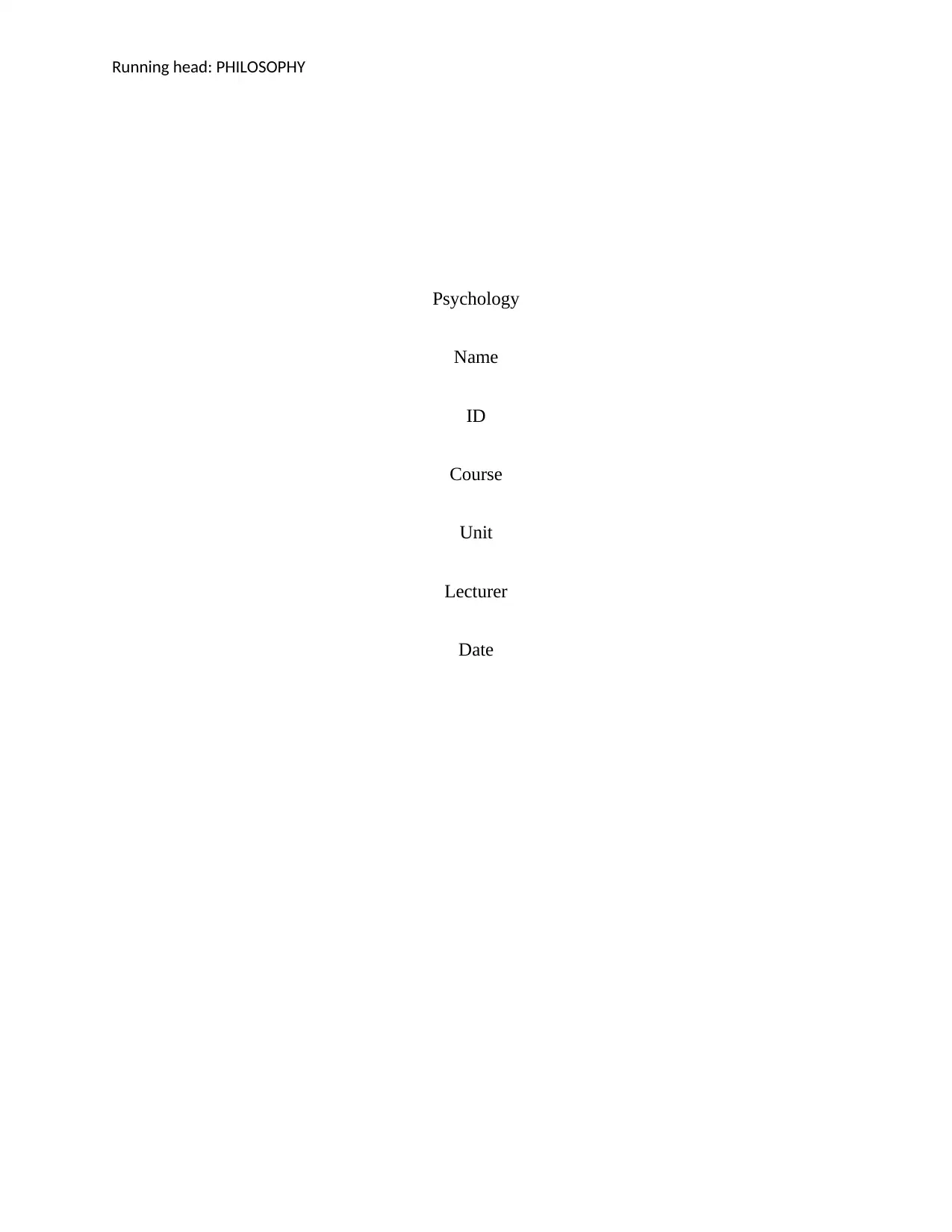
Running head: PHILOSOPHY
Psychology
Name
ID
Course
Unit
Lecturer
Date
Psychology
Name
ID
Course
Unit
Lecturer
Date
Paraphrase This Document
Need a fresh take? Get an instant paraphrase of this document with our AI Paraphraser
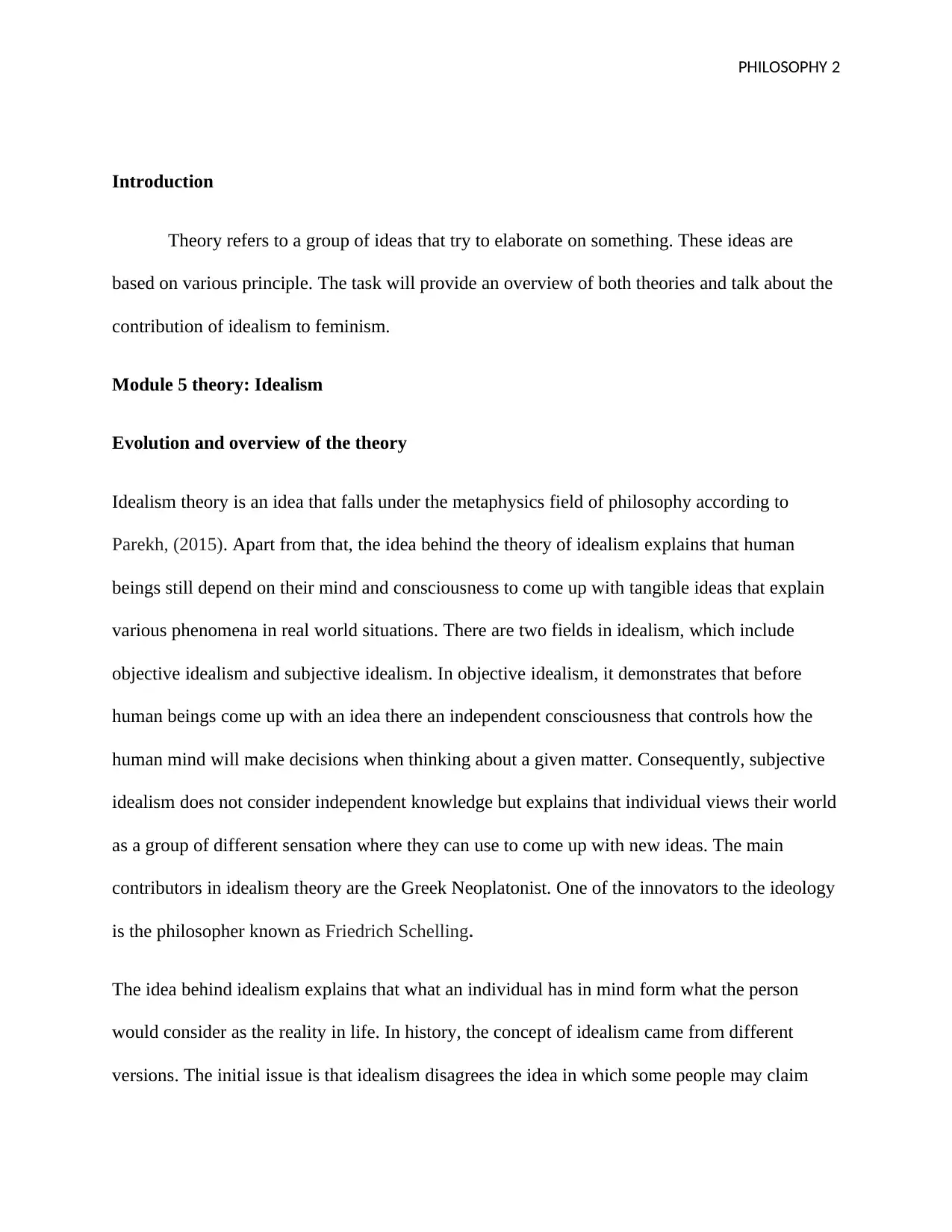
PHILOSOPHY 2
Introduction
Theory refers to a group of ideas that try to elaborate on something. These ideas are
based on various principle. The task will provide an overview of both theories and talk about the
contribution of idealism to feminism.
Module 5 theory: Idealism
Evolution and overview of the theory
Idealism theory is an idea that falls under the metaphysics field of philosophy according to
Parekh, (2015). Apart from that, the idea behind the theory of idealism explains that human
beings still depend on their mind and consciousness to come up with tangible ideas that explain
various phenomena in real world situations. There are two fields in idealism, which include
objective idealism and subjective idealism. In objective idealism, it demonstrates that before
human beings come up with an idea there an independent consciousness that controls how the
human mind will make decisions when thinking about a given matter. Consequently, subjective
idealism does not consider independent knowledge but explains that individual views their world
as a group of different sensation where they can use to come up with new ideas. The main
contributors in idealism theory are the Greek Neoplatonist. One of the innovators to the ideology
is the philosopher known as Friedrich Schelling.
The idea behind idealism explains that what an individual has in mind form what the person
would consider as the reality in life. In history, the concept of idealism came from different
versions. The initial issue is that idealism disagrees the idea in which some people may claim
Introduction
Theory refers to a group of ideas that try to elaborate on something. These ideas are
based on various principle. The task will provide an overview of both theories and talk about the
contribution of idealism to feminism.
Module 5 theory: Idealism
Evolution and overview of the theory
Idealism theory is an idea that falls under the metaphysics field of philosophy according to
Parekh, (2015). Apart from that, the idea behind the theory of idealism explains that human
beings still depend on their mind and consciousness to come up with tangible ideas that explain
various phenomena in real world situations. There are two fields in idealism, which include
objective idealism and subjective idealism. In objective idealism, it demonstrates that before
human beings come up with an idea there an independent consciousness that controls how the
human mind will make decisions when thinking about a given matter. Consequently, subjective
idealism does not consider independent knowledge but explains that individual views their world
as a group of different sensation where they can use to come up with new ideas. The main
contributors in idealism theory are the Greek Neoplatonist. One of the innovators to the ideology
is the philosopher known as Friedrich Schelling.
The idea behind idealism explains that what an individual has in mind form what the person
would consider as the reality in life. In history, the concept of idealism came from different
versions. The initial issue is that idealism disagrees the idea in which some people may claim
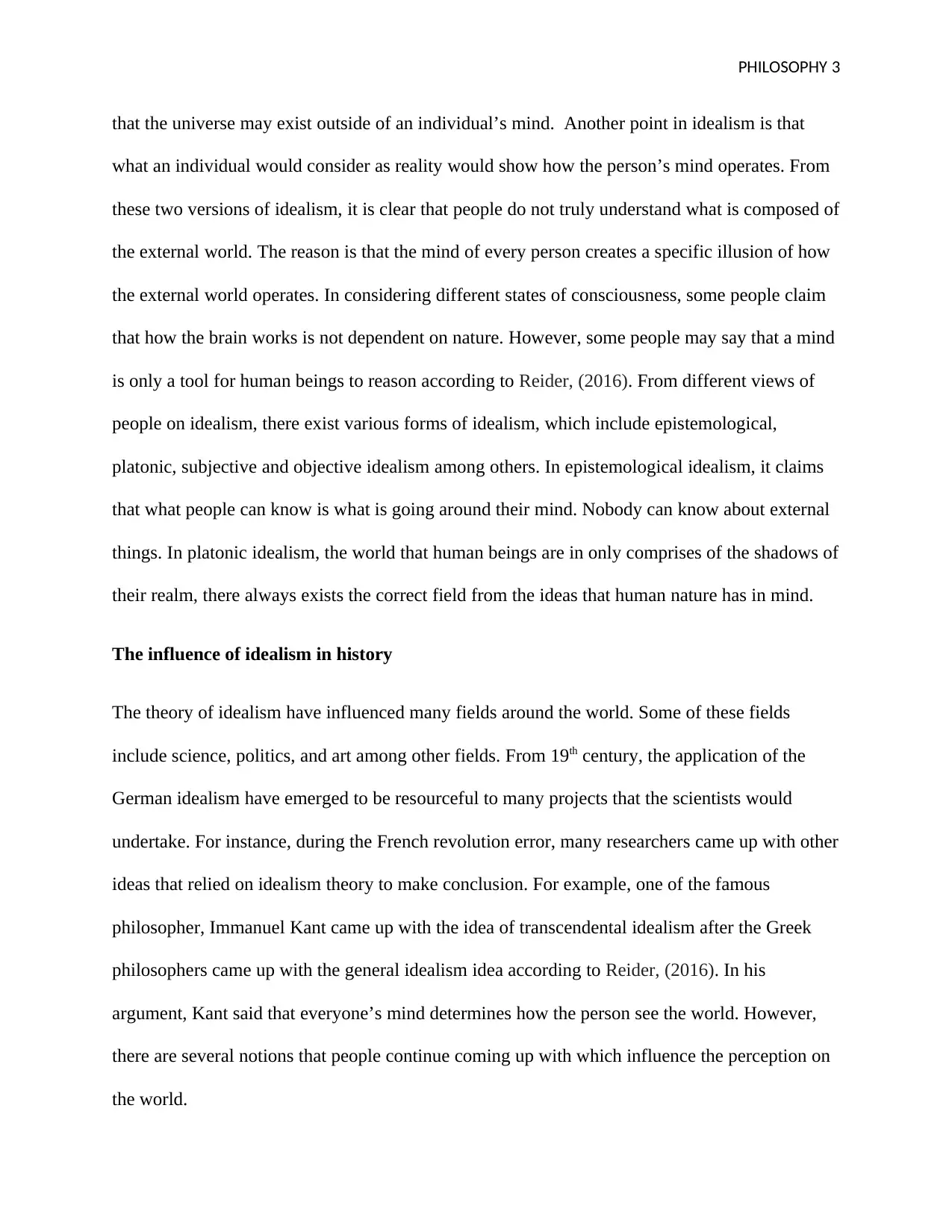
PHILOSOPHY 3
that the universe may exist outside of an individual’s mind. Another point in idealism is that
what an individual would consider as reality would show how the person’s mind operates. From
these two versions of idealism, it is clear that people do not truly understand what is composed of
the external world. The reason is that the mind of every person creates a specific illusion of how
the external world operates. In considering different states of consciousness, some people claim
that how the brain works is not dependent on nature. However, some people may say that a mind
is only a tool for human beings to reason according to Reider, (2016). From different views of
people on idealism, there exist various forms of idealism, which include epistemological,
platonic, subjective and objective idealism among others. In epistemological idealism, it claims
that what people can know is what is going around their mind. Nobody can know about external
things. In platonic idealism, the world that human beings are in only comprises of the shadows of
their realm, there always exists the correct field from the ideas that human nature has in mind.
The influence of idealism in history
The theory of idealism have influenced many fields around the world. Some of these fields
include science, politics, and art among other fields. From 19th century, the application of the
German idealism have emerged to be resourceful to many projects that the scientists would
undertake. For instance, during the French revolution error, many researchers came up with other
ideas that relied on idealism theory to make conclusion. For example, one of the famous
philosopher, Immanuel Kant came up with the idea of transcendental idealism after the Greek
philosophers came up with the general idealism idea according to Reider, (2016). In his
argument, Kant said that everyone’s mind determines how the person see the world. However,
there are several notions that people continue coming up with which influence the perception on
the world.
that the universe may exist outside of an individual’s mind. Another point in idealism is that
what an individual would consider as reality would show how the person’s mind operates. From
these two versions of idealism, it is clear that people do not truly understand what is composed of
the external world. The reason is that the mind of every person creates a specific illusion of how
the external world operates. In considering different states of consciousness, some people claim
that how the brain works is not dependent on nature. However, some people may say that a mind
is only a tool for human beings to reason according to Reider, (2016). From different views of
people on idealism, there exist various forms of idealism, which include epistemological,
platonic, subjective and objective idealism among others. In epistemological idealism, it claims
that what people can know is what is going around their mind. Nobody can know about external
things. In platonic idealism, the world that human beings are in only comprises of the shadows of
their realm, there always exists the correct field from the ideas that human nature has in mind.
The influence of idealism in history
The theory of idealism have influenced many fields around the world. Some of these fields
include science, politics, and art among other fields. From 19th century, the application of the
German idealism have emerged to be resourceful to many projects that the scientists would
undertake. For instance, during the French revolution error, many researchers came up with other
ideas that relied on idealism theory to make conclusion. For example, one of the famous
philosopher, Immanuel Kant came up with the idea of transcendental idealism after the Greek
philosophers came up with the general idealism idea according to Reider, (2016). In his
argument, Kant said that everyone’s mind determines how the person see the world. However,
there are several notions that people continue coming up with which influence the perception on
the world.
⊘ This is a preview!⊘
Do you want full access?
Subscribe today to unlock all pages.

Trusted by 1+ million students worldwide
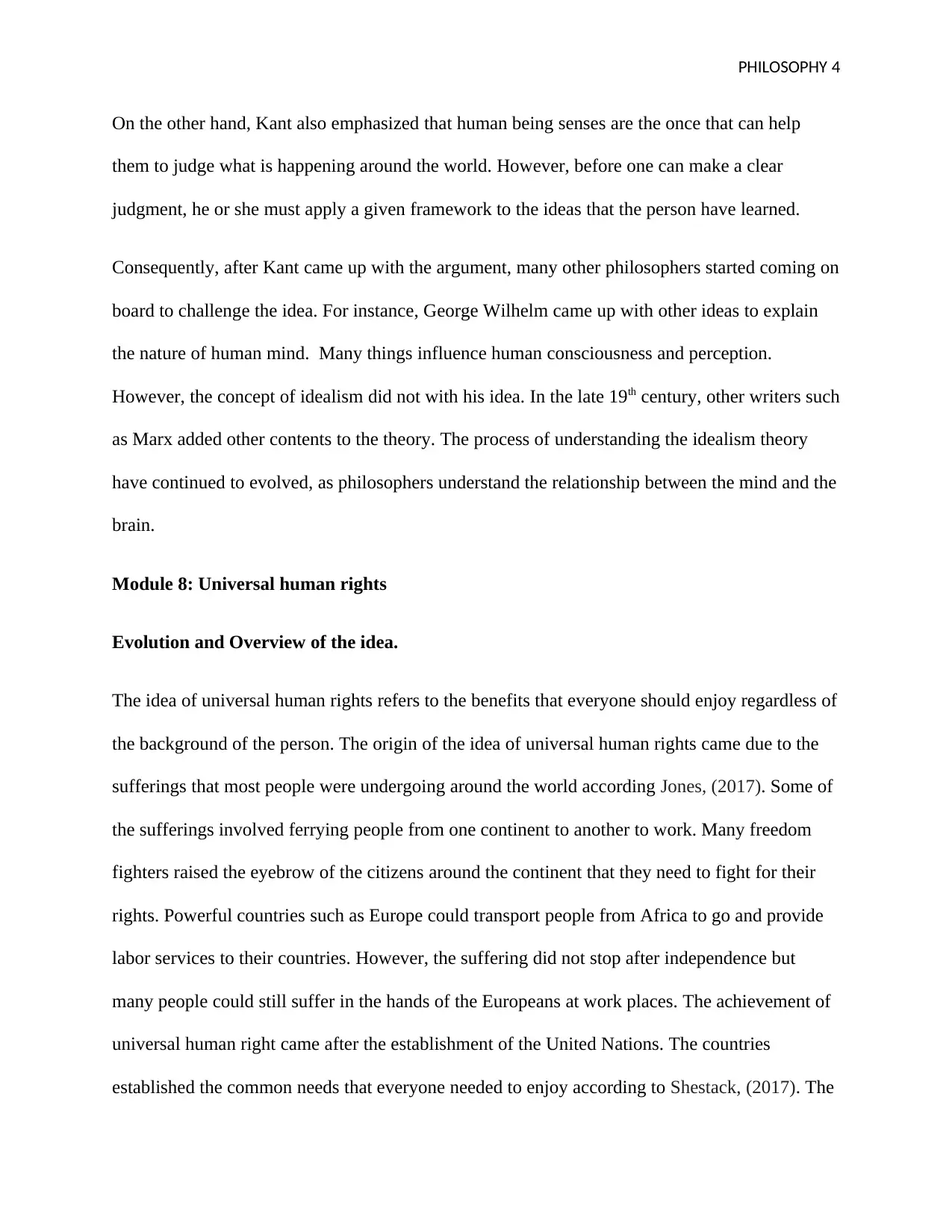
PHILOSOPHY 4
On the other hand, Kant also emphasized that human being senses are the once that can help
them to judge what is happening around the world. However, before one can make a clear
judgment, he or she must apply a given framework to the ideas that the person have learned.
Consequently, after Kant came up with the argument, many other philosophers started coming on
board to challenge the idea. For instance, George Wilhelm came up with other ideas to explain
the nature of human mind. Many things influence human consciousness and perception.
However, the concept of idealism did not with his idea. In the late 19th century, other writers such
as Marx added other contents to the theory. The process of understanding the idealism theory
have continued to evolved, as philosophers understand the relationship between the mind and the
brain.
Module 8: Universal human rights
Evolution and Overview of the idea.
The idea of universal human rights refers to the benefits that everyone should enjoy regardless of
the background of the person. The origin of the idea of universal human rights came due to the
sufferings that most people were undergoing around the world according Jones, (2017). Some of
the sufferings involved ferrying people from one continent to another to work. Many freedom
fighters raised the eyebrow of the citizens around the continent that they need to fight for their
rights. Powerful countries such as Europe could transport people from Africa to go and provide
labor services to their countries. However, the suffering did not stop after independence but
many people could still suffer in the hands of the Europeans at work places. The achievement of
universal human right came after the establishment of the United Nations. The countries
established the common needs that everyone needed to enjoy according to Shestack, (2017). The
On the other hand, Kant also emphasized that human being senses are the once that can help
them to judge what is happening around the world. However, before one can make a clear
judgment, he or she must apply a given framework to the ideas that the person have learned.
Consequently, after Kant came up with the argument, many other philosophers started coming on
board to challenge the idea. For instance, George Wilhelm came up with other ideas to explain
the nature of human mind. Many things influence human consciousness and perception.
However, the concept of idealism did not with his idea. In the late 19th century, other writers such
as Marx added other contents to the theory. The process of understanding the idealism theory
have continued to evolved, as philosophers understand the relationship between the mind and the
brain.
Module 8: Universal human rights
Evolution and Overview of the idea.
The idea of universal human rights refers to the benefits that everyone should enjoy regardless of
the background of the person. The origin of the idea of universal human rights came due to the
sufferings that most people were undergoing around the world according Jones, (2017). Some of
the sufferings involved ferrying people from one continent to another to work. Many freedom
fighters raised the eyebrow of the citizens around the continent that they need to fight for their
rights. Powerful countries such as Europe could transport people from Africa to go and provide
labor services to their countries. However, the suffering did not stop after independence but
many people could still suffer in the hands of the Europeans at work places. The achievement of
universal human right came after the establishment of the United Nations. The countries
established the common needs that everyone needed to enjoy according to Shestack, (2017). The
Paraphrase This Document
Need a fresh take? Get an instant paraphrase of this document with our AI Paraphraser
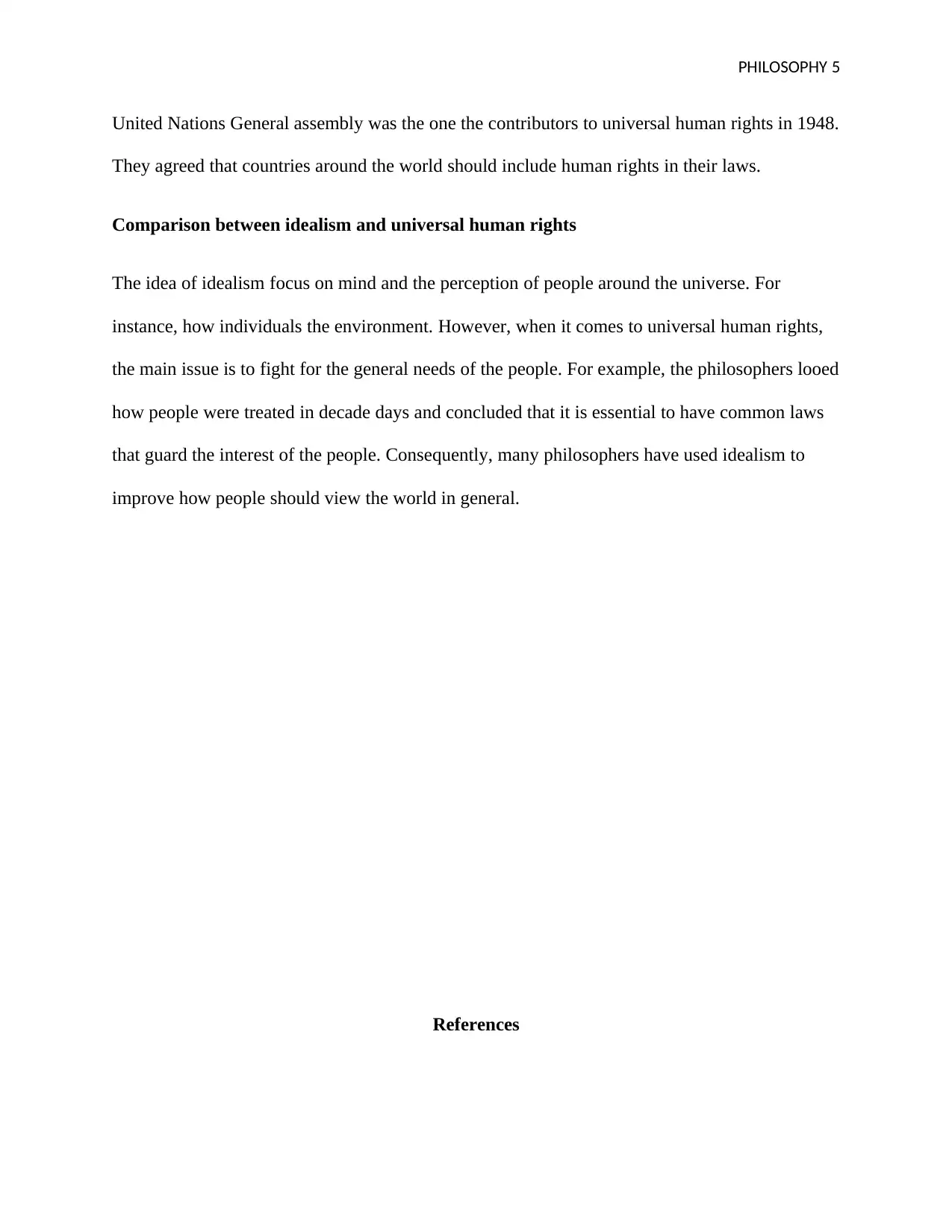
PHILOSOPHY 5
United Nations General assembly was the one the contributors to universal human rights in 1948.
They agreed that countries around the world should include human rights in their laws.
Comparison between idealism and universal human rights
The idea of idealism focus on mind and the perception of people around the universe. For
instance, how individuals the environment. However, when it comes to universal human rights,
the main issue is to fight for the general needs of the people. For example, the philosophers looed
how people were treated in decade days and concluded that it is essential to have common laws
that guard the interest of the people. Consequently, many philosophers have used idealism to
improve how people should view the world in general.
References
United Nations General assembly was the one the contributors to universal human rights in 1948.
They agreed that countries around the world should include human rights in their laws.
Comparison between idealism and universal human rights
The idea of idealism focus on mind and the perception of people around the universe. For
instance, how individuals the environment. However, when it comes to universal human rights,
the main issue is to fight for the general needs of the people. For example, the philosophers looed
how people were treated in decade days and concluded that it is essential to have common laws
that guard the interest of the people. Consequently, many philosophers have used idealism to
improve how people should view the world in general.
References
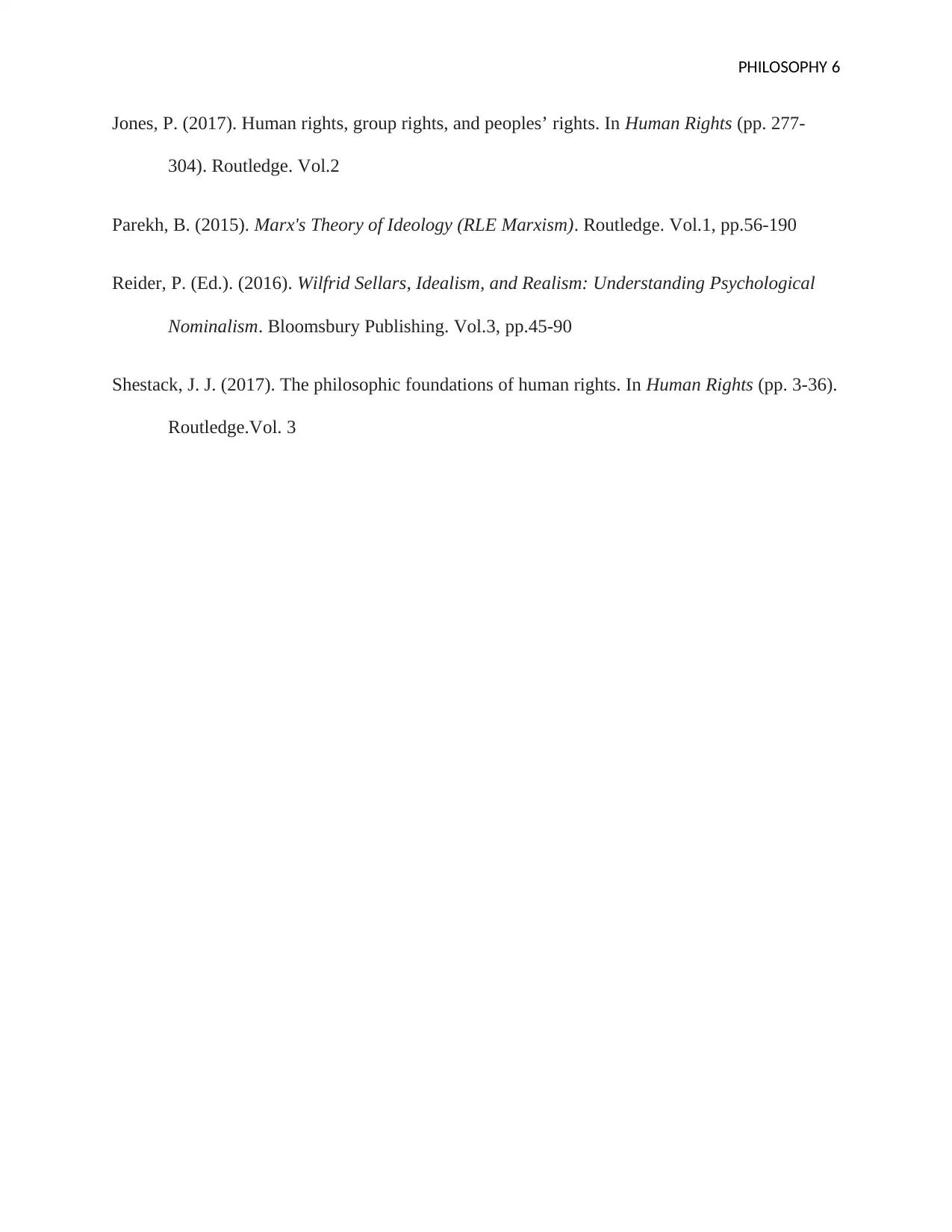
PHILOSOPHY 6
Jones, P. (2017). Human rights, group rights, and peoples’ rights. In Human Rights (pp. 277-
304). Routledge. Vol.2
Parekh, B. (2015). Marx's Theory of Ideology (RLE Marxism). Routledge. Vol.1, pp.56-190
Reider, P. (Ed.). (2016). Wilfrid Sellars, Idealism, and Realism: Understanding Psychological
Nominalism. Bloomsbury Publishing. Vol.3, pp.45-90
Shestack, J. J. (2017). The philosophic foundations of human rights. In Human Rights (pp. 3-36).
Routledge.Vol. 3
Jones, P. (2017). Human rights, group rights, and peoples’ rights. In Human Rights (pp. 277-
304). Routledge. Vol.2
Parekh, B. (2015). Marx's Theory of Ideology (RLE Marxism). Routledge. Vol.1, pp.56-190
Reider, P. (Ed.). (2016). Wilfrid Sellars, Idealism, and Realism: Understanding Psychological
Nominalism. Bloomsbury Publishing. Vol.3, pp.45-90
Shestack, J. J. (2017). The philosophic foundations of human rights. In Human Rights (pp. 3-36).
Routledge.Vol. 3
⊘ This is a preview!⊘
Do you want full access?
Subscribe today to unlock all pages.

Trusted by 1+ million students worldwide
1 out of 6
Related Documents
Your All-in-One AI-Powered Toolkit for Academic Success.
+13062052269
info@desklib.com
Available 24*7 on WhatsApp / Email
![[object Object]](/_next/static/media/star-bottom.7253800d.svg)
Unlock your academic potential
Copyright © 2020–2026 A2Z Services. All Rights Reserved. Developed and managed by ZUCOL.





